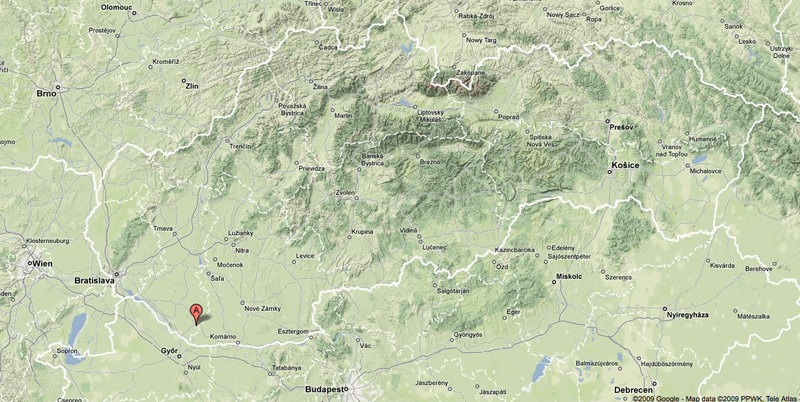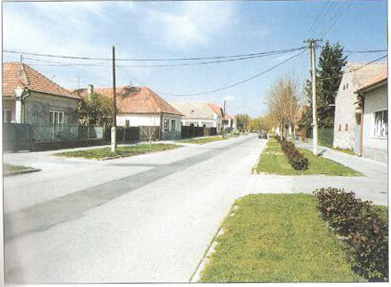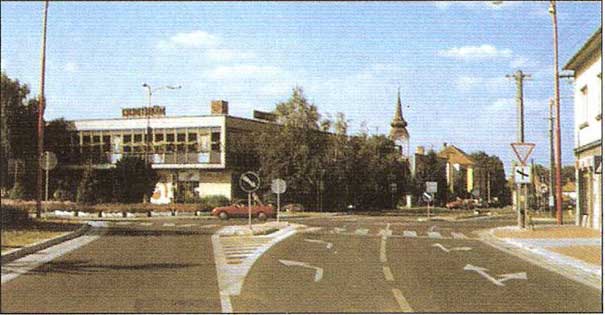Nagymegyer, Hungary Vel'ký Meder, Velky Mader, Čalovo (Slovak); Nagy Meder, Nagy Megyer, Nagymegyer (Hungarian); Villa Meger (earliest reference 1268) |
 |
||||||||
Town names and approximate associated dates:
Vel'ký Meder is a small town with population of just over 9,100 inhabitants, inhabited mostly by Hungarians (84.6% according to the 2001 census). The the town is in southern Slovakia, about 8 miles from the Hungarian border and 36 miles (58km) ESE of Bratislava. Lately, its thermal bath facilities have attracted growing tourism from the neighboring countries. Historically part of Hungary, the town became part of Czechoslovakia after World War I. Hungary invaded and subsequently annexed Southern Slovakia in 1938, including Nagymegyer, during World War II and it remained part of Hungary until the Treaty of Paris, February 10, 1947 reestablished the former border between Czechoslovakia and Hungary to its January 1, 1938 state. Vel'ký Meder became part of the Slovak Republic when it became an independent state, January 1, 1993. |
|||||||||
|
|||||||||
Maps |
|||||||||
|
Use the following maps to locate Vel'ký Meder:
Jewish Population Prior to the second World War, Vel'ký Meder had a lively Jewish congregation of 100 families and over 500 souls. They conducted full-scale community life, with all the necessary social and ritual services. See "Our Shtetl" for a short description of Nagymegyer and its Jewish community. Jews settled in Nagymegyer in the mid-1700s, but in the 19th century, the community had its own synagogue, cemetery, and Jewish schools. By the end of the first World War, Jews owned most of the businesses in the town. The Jewish population peaked at 522 in 1941. Some of the population figures follow:
Jewish Homes in Nagymegyer in 1944 is a map and list of families that Mr. Alexander Gerhát reconstructed to remember the Jewish community in Nagymegyer as it existed in 1944. Holocaust and RemembranceWidespread persecution of the Jewish community began after the Hungarian annexation in November 1938. Jews were conscripted into forced labor units and their businesses were confiscated. In June 1944 all the Jews of the town, together with the smaller Jewish communities in the surrounding villages, were deported to Auschwitz. Only approximately 100 individuals survived and returned. The welcome of the local population was less than friendly and the survivors gradually left there, most of them migrating to Israel by 1949. The town currently has no Jewish inhabitants. In June 2004 the municipality erected a trilingual memorial plaque (Slovak, Hebrew and Hungarian) for the 418 town citizens who perished in the Holocaust, and it now conducts an annual commemoration service in front of it on the Jahrzeit day of their murder.
Memoirs and Family Stories
Searchable DatabasesReferences:
Additional Information about Hungarian Jewish Genealogy | |||||||||
Compiled by Yehoshua Weiss who welcomes your comments. Webmaster: Benjamin C. Schoenbrun Updated March 1, 2009 ©2009 Yehoshua Weiss |
|||||||||
JewishGen, Inc., the Home of Jewish Genealogy hosts this site at no cost. If this site has aided you in your research and you wish to further our mission of preserving our history for future generations, your JewishGen-erosity is greatly appreciated. |
|||||||||

